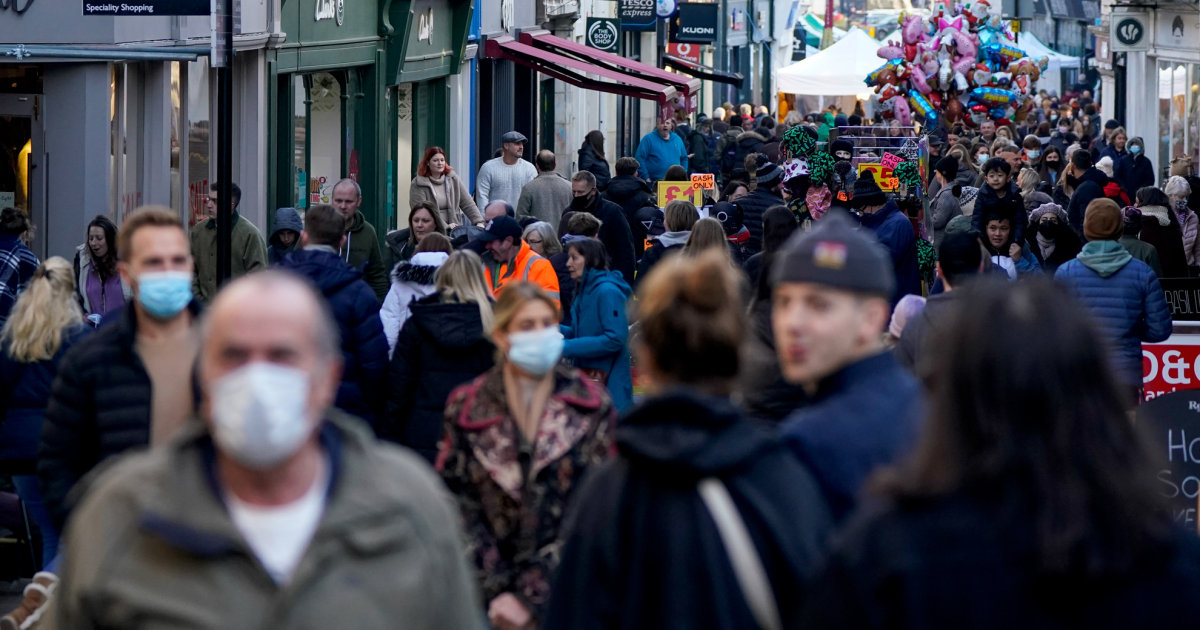
Covid-19’s omicron variant may spare the majority of those infected from being hospitalized, new research from the United Kingdom shows.
The research, from Public Health Scotland, found that people who were infected with the omicron variant in November and December were about two-thirds less likely to be hospitalized, compared with the delta variant. It also comes as the omicron variant is increasingly associated with milder symptoms, at least for those who are vaccinated.
For full coverage of the Covid-19 pandemic
The study, while not yet published in a peer-reviewed journal and considered by researchers as “very, very preliminary,” is likely welcome news to Americans in the midst of a massive spike in Covid-19 cases, driven primarily by omicron, before a busy holiday weekend.
During a media briefing Wednesday, Dr. Jim McMenamin, a director at Public Health Scotland, called the research “qualified good news,” but added that “it’s important that we don’t get ahead of ourselves. The potentially serious impact of omicron on a population can’t be underestimated.”
What’s more, the vast majority of omicron cases appeared to be among people who previously had Covid-19. The proportion of omicron cases in the study that were possible reinfections, researchers wrote, was more than 10 times the number of delta cases.
The research, which included 5.4 million people, comes with caveats, including the fact that the omicron variant has not been reported in most of Scotland’s elderly population.
While promising, “it doesn’t mean that we are able to throw caution to the wind and have a big holiday party in which we get all of our elderly relatives together and start coughing on them,” said Bill Hanage, an associate professor of epidemiology at Harvard’s T.H. Chan School of Public Health.
Another study, from South Africa’s National Institute for Communicable Diseases, had similar findings, suggesting that people with the omicron variant were more than three-quarters less likely to be hospitalized.
A third report released Wednesday, from the U.K’s Imperial College London, also showed a reduction in omicron-related hospitalizations compared to delta. But the decline was not as robust as the Scottish study.
The London study, which included 56,000 omicron cases and 269,000 delta cases, found that people with omicron were about 40 percent less likely to be hospitalized for at least one night.
None of the studies released Wednesday have been published in a peer-reviewed journal.
The omicron variant is the dominant strain in the U.S., having overtaken the delta variant in a matter of weeks. According to the Centers for Disease Control and Prevention, omicron accounts for 73 percent of new cases, up from about 13 percent a week ago. Some areas, including New York and New Jersey as well parts of the Midwest, South and Pacific Northwest are reporting that omicron accounts for more than 90 percent of new cases.
The latest research out of Scotland and South Africa is “good news,” Dr. Anthony Fauci, President Joe Biden’s chief medical adviser, said Wednesday at a White House Covid-19 Task Force briefing. But, he said, “we must wait to see what happens in our own population, which has its own demographic considerations.”
“I would point out that even if you have a diminution in severity, if you have a much larger number of individual cases, the fact that you have so many more cases might actually obviate the effect of it being less severe,” he said.
One of the leading pandemic models projects that omicron could indeed lead to a large wave of cases.
Dr. Christopher Murray, a professor of health metrics sciences at the University of Washington and director of the Institute for Health Metrics and Evaluation (IHME), said omicron will likely spread to most countries by the end of December and that the world could see “an enormous surge in infections” in the coming months.
The institute’s models estimate that more than 3 billion Covid-19 infections could be recorded globally between now and the end of March, driven primarily by the highly contagious omicron variant.
“That is about the same number of infections that have occurred in the last two years, so we are having a compressed transmission cycle,” Murray said Wednesday in a news briefing.
He said that the huge spike in infections will likely strain hospitals but added that the IHME models incorporate data from South Africa and the United Kingdom, where omicron cases have so far been associated with milder disease. As such, Murray said the fraction of infections that need hospitalization are projected to be 90 to 96 percent lower than with the delta variant.
“That’s why we see a surge, but not a catastrophic surge,” Murray said of projected hospitalizations during this current wave.
The IHME is forecasting that deaths globally and in the U.S. will likely rise over the winter but that omicron is expected to cause fewer fatalities compared to delta.
Follow NBC HEALTH on Twitter & Facebook.
Source: | This article originally belongs to Nbcnews.com









